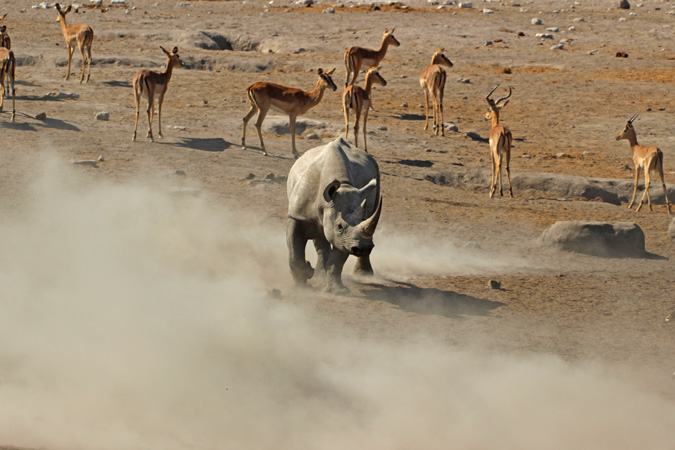On the surface, the upcoming legal auction of rhino horn set to begin on August 21 might appear to be a harmless propaganda exercise, but it may in fact signal a deepening of the rhino crisis. Written by Peter Knights, co-founder and CEO of WildAid
The domestic market for rhino horn in South Africa is small, and history shows that criminals will exploit all possible loopholes to obtain horn for trafficking to markets abroad. Further, the track record of South Africa’s Department of Environmental Affairs (DEA) in regulating legal trade in rhino horn does not instill confidence.
The recent rhino poaching crisis was triggered about a decade ago as new uses for horn – and new ways of obtaining horn – emerged in Vietnam. Vietnamese criminals, working with South African hunters, realised that they could import rhino “hunting trophies” into Vietnam with little or no oversight. This was replicated in China and provided a means for traffickers to supply horns to East Asian markets. The practice, now known as “pseudo-hunting,” was allowed to continue for years without action from the DEA. Although the commercial sale of hunting trophies was prohibited, South African authorities had no way to regulate what was done with trophy horns once they left the country. This will also be the case with horns purchased at auction.

Between 20 and 25% of South Africa’s rhinos are in the possession of private rhino owners, many of whom have stockpiled large quantities of horn from natural deaths and de-horning live rhinos. They portray the forthcoming horn auction as strictly for South Africa-based buyers and, therefore, within the law. Yet the auction has been advertised in Chinese and Vietnamese, leading to confusion and arousing suspicion. These mixed messages have caused the DEA to issue a statement reaffirming that international trade in rhino horn remains banned.
A moratorium on domestic horn sales was in effect in South Africa from 2009 until it was overturned earlier this year upon legal challenge from private owners. Before the moratorium, an average of only 100 kilograms of horns were sold domestically each year, according to a 2014 DEA report. While the figure was believed to be a low estimate, it is agreed that the domestic market is small, with limited demand for horn. Therefore, there is little to gain financially from an auction targeted solely at domestic bidders.
Previous sales before the moratorium indicate that horns will likely be trafficked abroad. The same 2014 DEA report includes information from seven unnamed private rhino owners who sold horns before the 2009 moratorium. One stated that the buyers were Chinese and that s/he suspected that the horns were taken to China. Three others indicated suspicions that the horns purchased had been smuggled out of the country to be traded on the black market. The three remaining sellers were “unsure” of what happened to their horns.
By opening a “domestic” trade in rhino horn with this auction, there is a real threat that, without credible enforcement, these horns will fuel the rampant international trade and sustain the poaching crisis. While rhino poaching has started to decline slightly in South Africa, far too many rhinos are being killed for their horns. In recent years, more than 1,000 of the country’s remaining 20,000 rhinos have been lost to poachers annually, and high-level traffickers continue to evade prosecution.
At the opposite end of the trade chain, campaigns to reduce rhino demand in Asia have shown signs of progress. Horns are now being sold at around one-third of previously reported levels. Opening up a new source of horn through “domestic” auctions in South Africa may well re-stimulate consumer demand, just as “pseudo-hunting” did before it.
At this critical moment for Africa’s rhinos, we would do well to remember the hard lesson learned from legal ivory sales. Although intended to satiate Asian demand, legal ivory sales ignited it instead. About 30,000 African elephants are killed each year for their ivory as the international community attempts to correct its mistake.
Conservationists fear that most of the rhino horn sold at the upcoming “domestic” auction will be taken out of the country. Sellers must also be aware of this, and the DEA must be extremely naive to think that the bidders will be buying purely for the domestic market. We should acknowledge the presence of the rhino in the room and recognise the proposed auction for what it is: the first stage of a wider plan to legalise the export of rhino horn, a plan that the DEA has already put in motion.
Private commercial considerations have been elevated over conserving wildlife, which is evident in almost all DEA decisions. The commercial tail continues to wag the policy dog at the expense of Africa’s rhinos.
Also read: Opinion: Rhino horn trade = extinction in the wild
To comment on this story: Login (or sign up) to our app here - it's a troll-free safe place 🙂.![]()






